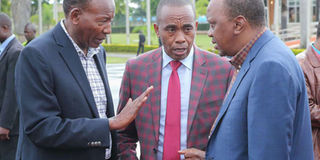How CS Nkaissery kicked out cartels from ministry

Interior Cabinet Secretary Joseph Nkaissery (left), Kiambu Senator Paul Wamatangi (center) and President Uhuru Kenyatta talk at JKIA before the President departed for a state visit to France, on April 3, 2016. The CS tried to root out corruption in the police service. PHOTO | PSCU | NATION MEDIA GROUP
What you need to know:
- Mr Nkaissery said he suspended all tenders in the police to ensure they were above board.
- State Department of the Interior in the 2014/2015 financial year was reported to have blown Sh4.6 billion.
In June last year at the Radisson Royal Blu Hotel in Brussels, Belgium, Interior Cabinet Secretary Joseph Nkaissery gave the Nation an interview that would reveal the onerous task President Uhuru Kenyatta gave him on his appointment to the jinxed docket in December 2014.
That was when Okoa Kenya protests were on and he had in police cells lawmakers Moses Kuria (Gatundu South), Kimani Ngunjiri (Bahati) and Ferdinand Waititu (Kabete) from Jubilee as well as Cord’s Junet Mohamed (Suna East), Johnson Muthama (Machakos), Timothy Bosire (Kitutu-Masaba), Aisha Jumwa (Woman rep, Kilifi) and Florence Mutua (Woman rep, Busia).
“Anybody who will issue inciting statements will be arrested,” Maj-Gen (Rtd) Nkaissery said.
“That is why we have arrested eight MPs and remanded them. They will face judicial consequences. I urge leaders to give unifying and cohesive messages to the public.”
COLLABORATION
Giving an insight into the state of national security, he revealed that President Kenyatta tasked him to find a way of how the police and the military could work together to end insecurity when he appointed him.
“One of the tasks from the President was to find a modus operandi (mode of operation), to chart a way to ensure there is security in the country,” Mr Nkaissery said.
“And the main guidelines from the President was to eliminate corruption in the ministry, especially the Office of the President.
“It is publicly known that the OP was corrupt.”
CORRUPTION
The retired general continued: “It took me 90 days to study the situation and I started moving people whom I suspected.
"I targeted procurement officers because that is where corruption thrives. It has been a remarkable job with good results.”
Mr Nkaissery would in November 2015 tell the Public Accounts Committee about finding cartels and brokers resident at his new station.
CARTELS
He told the MPs that in the first 90 days after taking over at the ministry, “there was a lot of traffic of vendors and cartels” in the corridors of Harambee House.
The CS said he met the President and the Deputy President to ask what the “boundaries and red lines” on such matters were and was told to go all the way.
“I kicked out the vendors. I know one vendor who has been shuttling between Harambee House and Harambee House Annex and one day I kicked him out of my office,” Mr Nkaissery said.
TENDERS
Mr Nkaissery said he suspended all tenders in the police to ensure they were above board, with the ministry later resolving to deal directly with manufacturers of equipment rather than brokers.
Without somebody skimming a fee in such contracts, they figured, the country would get a better deal.
“It is a lot cheaper when you go directly. It cuts off cartels. There is no ‘10 per cent’ for the brokers and salesmen.
"That is what inflates the prices. So far nothing has gone wrong,” Mr Nkaissery said then.
BROKERS
That the government was dealing directly with manufacturers was evident when, in November 2015, a letter from the Office of the Auditor-General was read at the meeting of the PAC where Mr Nkaissery spoke about the encounter with the broker.
Apparently, auditors had trouble getting hold of payment vouchers for contracts worth Sh3.8 billion.
Some of the payments were to helicopter makers AgustaWestland, equipment manufacturers Ispra/Israel Product Research Company and Jino Motors and vehicle sellers Toyota Kenya and D.T. Dobie.
ANGLO-LEASING
Others related to Israel Weapon Industries, helicopter servicers Lom Praha Trade, weapon makers Silver Shadow and China North Industries Corporation, who make all manner of security equipment.
Whether there was value for money in these purchases and others was cast in doubt by the Auditor-General, who ranked the State Department of the Interior among those who wasted money in the 2014/2015 financial year.
PROCUREMENT
The ministry was reported to have blown Sh4.6 billion, a significant fraction of the Sh14.4 billion rated as “wasteful expenditure”.
The Auditor-General said the wasteful expenditure was where “value for money could not be established” and “much of wastage occurred in the course of procurement”.
During the interview in the Belgian capital, Mr Nkaissery explained that he held a meeting with Inspector-General of Police Joseph Boinnet to agree on how they would tackle corruption in the police, with a sharp focus on the traffic department.
“The most affected is the traffic police department and the Inspector-General is focusing on it. The ongoing vetting is one of the ways,” the CS said.
POLICE VETTING
Mr Nkaissery was categorical that vetting, which exposed how junior officers move millions of shillings by M-Pesa to their seniors, will not end corruption in the police service.
“I don’t think vetting is being carried out to determine corruption in the service,” he said.
“I don’t believe that somebody who has been working for 30 years can be vetted for suitability.
LIFESTYLE AUDIT
“How do you vet his suitability after those years? It is just like walking into the Kenya Army and say you want to vet a general who has been working for 30 years.
"It is very difficult to vet a person who has risen from a corporal to a superintendent all these years.
“Maybe the best way is to carry out a lifestyle audit.”
Attributing the lull in crime and terror attacks to proper coordination of the police and the military, Mr Nkaissery however admitted that terrorism was the greatest challenge in the docket.





